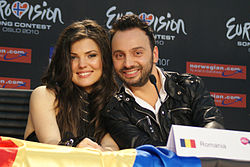Romania at the Eurovision Song Contest
- Broadcasting company
- TVR
- First participation
- 1993
- Number of participations
- 21 (as of 2019)
- Highest ranking
- 3 ( 2005 , 2010 )
- Highest Score
- 282 ( 2017 )
- Lowest Score
- 6 ( 1998 )
- Points average (since first post)
- 82.40 (as of 2019)
- Average points per voting country in the 12-point system
- 2.00 (as of 2019)
This article looks at the history of Romania as a participant in the Eurovision Song Contest .
Regularity of participation and successes in competition
Romania took part in the Eastern European preliminary decision for the Eurovision Song Contest as early as 1993 and came last among seven participants. Thus, da country with the singer Dida Drăgan and her song Nu pleca could not qualify for Millstreet. So it came to the debut in 1994, which was not very successful. The singer Dan Bittman only finished 21st out of 25. In the following year Romania had to take a break due to the bad position of the previous year. In 1996 the EBU then organized an internal preliminary decision on the song contest. The contribution Rugă pentru pacea lumii , sung by Monica Anghel & Sincron , ended up only in last place in the preliminary round, with Romania not taking part in 1996 either. Only in 1998 did the country take part in the final again, but only finished 22nd out of 25 with six points. To date, this is Romania's lowest score in the competition. Due to the poor ranking in 1998, the country had to take a forced break in 1999. In 2000 the band Taxi took part, but only achieved a place in the middle field with place 17 out of 24. This placement then led to another forced break for Romania in 2001. The country was only allowed to participate again in 2002 and was significantly more successful from now on.
In 2002 the duo Monica Anghel & Marcel Pavel performed the song Tell Me Why for Romania. Anghel already represented the country in 1996 in the internal preliminary decision of the EBU, but only came in last. In 2002, however, together with Marcel Pavel, they achieved 9th place in the final, which up until then had been the best placement in the country in the competition. After this success Romania also took part in 2003 and was able to place in the top ten again with 10th place. In 2004, however, the Romanian contribution again only reached 18th place. In 2005, the country therefore had to compete in the semi-finals for the first time. The singer Luminița Anghel and the band Sistem took first place in the semi-finals, with Romania successfully reaching the final. There came the big success, because in the end the country booked 3rd place with 158 points, which was the best Romanian placement and number of points up to that point. In 2006, the country was therefore again pre-qualified for the finals and was once again placed among the top five. The singer Mihai Trăistariu ended up in fourth place and with 172 points even got a higher number of points than the representatives of the previous year. In 2007, the country was again pre-qualified for the final, but only reached 13th place. Even the entries in 2008 and 2009 with 20th and 19th place could not build on their previous successes. Only in 2010 was there another success to celebrate for Romania.
The duo Paula Seling & Ovi came third in the final with 162 points, which is still the best Romanian result in the competition. In 2011, however, the Romanian contribution took 4th place in the semifinals, but only ended up in 17th place in the final. In 2012, the band Mandinga reached 3rd place in the semifinals, but only finished 12th in the final. In 2013, Cezar achieved a similar placement in the final and landed in 13th place, Paula Seling & Ovi, who took third place in 2010, represented the country again. After a second place in the semifinals, in the final there was only one placement in midfield for Romania with position 12. In 2015, the country only ended up in midfield with position 15. 2016 was originally planned for Romania to participate. TVR already held a national preliminary decision and thus already had a selected contribution. Due to debts of the Romanian broadcaster TVR 1 with the EBU totaling 16 million Swiss francs (around 14.5 million euros), Romania was disqualified for the competition on April 22, 2016, shortly before the ESC. According to the EBU, the Romanian broadcaster TVR has accumulated debts since January 2007. This made Romania the first country to be disqualified from the competition because of unpaid debts to the European Broadcasting Union (EBU). However, Romania returned to the competition in 2017.
So in 2017 the country sent Ilinca feat. Alex Florea with the song Yodel It! . After successfully qualifying for the final, the duo took 7th place and thus the best Romanian position since 2010. With 282 points, they also got a new high score for the country. After this success, the country also participated in 2018. In contrast to the previous year, the disappointment came there. The band The Humas only finished 11th in the semifinals, which meant that Romania was eliminated in the semifinals for the first time. Thus, in the same year as Azerbaijan and Russia , the country lost the status of having qualified for the final every time. However, while Azerbaijan and Russia made it to the finals again in the following year and both were among the top 10 in the final, Romania was eliminated again in the semi-finals. With 13th place, Ester Peony even got the worst Romanian result in the competition to date.
A total of nine of the 21 entries ended up in the left half of the table. Overall, Romania was eliminated twice in the semi-finals and has never finished last. With two third places and many places in the upper midfield, Romania is one of the average successful countries in the competition.
List of posts
Color legend: - 1st place. - 2nd place. - 3rd place. - Equal points with last place. - Eliminated in the semifinals / in the qualification / in the Eastern European preliminary decision. - no participation / not qualified. - Cancellation of the Eurovision Song Contest.
| year | Interpreter | Title Music (M) and Text (T) |
language | translation | final | Semi-final / qualification |
National preliminary decision |
||
|---|---|---|---|---|---|---|---|---|---|
| space | Points | space | Points | ||||||
| 1993 | Dida Dragan |
Nu pleca M: Dida Dragan ; T: Adrian Ordean |
Romanian | Do not go |
Not qualified Eastern European preliminary decision |
7/7 | 38 | Selecția Națională 1993 | |
| 1994 | Dan Bittman |
Dincolo de nori M: Antonio Furtuna; T: Antonio Furtuna, Dan Bittman |
Romanian | Beyond the clouds | 21/25 | 14th | Qualified directly for the final | Selecția Națională 1994 | |
| 1995 | Not qualified | ||||||||
| 1996 | Monica Anghel & Sincron |
Rugă pentru pacea lumii M: Cornel Fugaru; T: Mirela Voiculescu Fugaru |
Romanian | Prayer for world peace |
Not qualified qualifying round |
29/29 | 11 | Selecția Națională 1996 | |
| 1997 | No participation | ||||||||
| 1998 | Mălina Olinescu |
Eu cred M: Adrian Romcescu; T: Liliana Ștefan |
Romanian | I think | 22/25 | 6th | Qualified directly for the final | Selecția Națională 1998 | |
| 1999 | Not qualified | ||||||||
| 2000 | taxi |
The Moon M / T: Dan Teodorescu |
English | The moon | 17/24 | 25th | Qualified directly for the final | Selecția Națională 2000 | |
| 2001 | Not qualified | ||||||||
| 2002 | Monica Anghel & Marcel Pavel |
Tell Me Why M: Ionel Tudor; T: Mirela Voiculescu Fugaru |
English | tell me why | 9/24 | 71 | Qualified directly for the final | Selecția Națională 2002 | |
| 2003 | Nicola |
Don't Break My Heart M: Mihai Alexandru; T: Nicola |
English | Don't break my heart | 10/26 | 73 | Selecția Națională 2003 | ||
| 2004 | Sanda Ladoși |
I Admit M: George Popa; T: Irina Gligor |
English | I confess | 18/24 | 18th | Selecția Națională 2004 | ||
| 2005 | Luminița Anghel & Sistem |
Let Me Try M / T: Cristian Faur |
English | Let me try | 3/24 | 158 | 1 / 25th | 235 | Selecția Națională 2005 |
| 2006 | Mihai Trăistariu |
Tornerò M: Eduard Cîrcotă; T: Cristian Hriscu, Mihaela Deac |
English, Italian | I will turn back | 4/24 | 172 | Qualified directly for the final | Selecția Națională 2006 | |
| 2007 | Todomondo |
Liubi liubi, I Love You M: Mister M ; T: Mister M , Vlad Creţu , Ghedi Kamara |
English, Italian, Spanish , Russian , French , Romanian |
Love, love, i love you | 13/24 | 84 | Selecția Națională 2007 | ||
| 2008 | Nico & Vlad Miriță |
Pe-o margine de lume M: Andrei Tudor; T: Andreea Andrei, Adina Șute |
Romanian, Italian | At the edge of the world | 20/25 | 45 | 7/19 | 94 | Selecția Națională 2008 |
| 2009 | Elena Gheorghe |
The Balkan Girls M: Laurenţiu Duţă, Ovidiu Bistriceanu, Daris Mangal; T: Laurenţiu Duţă, Alexandru Pelin |
English | The girls from the Balkans | 19/25 | 40 | 9/18 | 67 | Selecția Națională 2009 |
| 2010 | Paula Seling & Ovi |
Playing with Fire M / T: Ovidiu Cernăuțeanu |
English | Play with fire | 3/25 | 162 | 4/17 | 104 | Selecția Națională 2010 |
| 2011 | Hotel FM |
Change M: Gabriel Băruță ; T: Gabriel Băruță , Alexandra Ivan |
English | Change | 17/25 | 77 | 4/19 | 111 | Selecția Națională 2011 |
| 2012 | Mandinga |
Zaleilah M: Costi Ionita; T: Elena Ionescu, Dihigo Omar Secada , Costi Ionita |
Spanish, English | - | 12/26 | 71 | 3/18 | 120 | Selecția Națională 2012 |
| 2013 | Cezar |
It's My Life M / T: Cristian Faur |
English | It's my life | 13/26 | 65 | 5/17 | 83 | Selecția Națională 2013 |
| 2014 | Paula Seling & Ovi |
Miracle M / T: Ovi , Philip Halloun, Frida Amundsen , Beyond51 |
English | wonder | 12/26 | 72 | 2/15 | 125 | Selecția Națională 2014 |
| 2015 | Voltaj |
De la capăt - All Over Again M: Călin Gavril Goia , Gabriel Constantin , Adrian Cristescu , Silviu-Marian Păduraru, Victor-Răzvan Alstani; T: Călin Gavril Goia , Gabriel Constantin , Adrian Cristescu , Silviu-Marian Păduraru, Victor-Răzvan Alstani, Monica-Ana Stevens, Andrei-Mădălin Leonte |
Romanian, English | From the beginning - the same again | 15/27 | 35 | 5/16 | 89 | Selecția Națională 2015 |
| 2016 | Ovidiu Anton |
Moment of Silence M / T: Ovidiu Anton |
English | Moment of silence |
Disqualification by the EBU Outstanding fees |
Selecția Națională 2016 | |||
| 2017 | Ilinca feat. Alex Florea |
Yodel It! M: Mihai Alexandru; T: Alexandra Niculae |
English | Yodel it! | 7/26 | 282 | 6/18 | 174 | Selecția Națională 2017 |
| 2018 | The Humans |
Goodbye M: Matei Alexandru , Alin Neagoe ; T: Cristina Caramarcu |
English | Goodbye | Eliminated | 11/18 | 107 | Selecția Națională 2018 | |
| 2019 | Ester Peony |
On a Sunday M: Ester Alexandra Creţu , Alexandru Şerbu; T: Ioana Victoria Badea |
English | On a Sunday | Eliminated | 13/18 | 71 | Selecția Națională 2019 | |
|
|
Roxen |
Alcohol You M: Ionuţ Armaşs, Viky Red; T: Ionuţ Armaş, Breyan Isaac |
English | I'll call you 1 |
Cancellation due to the COVID-19 pandemic by the EBU |
Selecția Națională 2020 | |||
| 2021 | Roxen | ||||||||
National preliminary decisions
So far, all Romanian contributions to the Eurovision Song Contest have been chosen as part of the national preliminary decision Selecția Națională , with the selection process changing.
1993 to 2002, 2005, 2010 to 2012, 2014 and 2015
From 1993 to 2002 the Romanian representative was elected in a “classic” preliminary decision, with between eleven and 20 contributions being presented each year in a show. A singer often presented two or more contributions. In 1993, the winner was determined by a survey of 1,100 households, in which not only Romanian but also Moldovan households were interviewed. In 1994 and 1996 the winner was determined by regional juries, in 1998 the juries were supplemented by televoting . In 2000, the first time voting took place exclusively by telephone, which led to a scandal: the composers of the runner-up title Why sued the Romanian television station because they were in the lead after the phone lines were open and the vote was only supposed to take an hour. For reasons unknown, the lines were open for two more hours, leaving Taxi to the top. This system was also used in 2005, 2010 to 2012, 2014 and 2015, but the winner was determined by 50% jury voting and 50% televoting.
2003 and 2004 as well as 2006 and 2007
In 2003 a new preliminary decision mode was developed, whereby two semi-finals should take place before the final. A total of six candidates per semi-final (with around twelve participants) should qualify for the final round, which did not always happen in the end: In 2003 only ten singers took part in the final after one entry was disqualified and a second was withdrawn. In 2007 the preliminary round proved to be particularly scandalous: after two disqualifications, only 22 singers took part in the semi-finals instead of 24. Before the final, three more titles were disqualified and a fourth was voluntarily withdrawn, leaving only eight songs.
2016 and 2017
In 2016 and 2017 there was a semi-final before the final. In 2016 there was a semi-final with twelve participants before the final. Six of them qualified for the final, with tele and jury voting each choosing three artists directly. In the final, six participants competed against each other, with only the televoting determining the winner. In 2017, however, there was a public casting before the semifinals, where a jury selected the 15 semifinalists. In the semi-finals, ten participants qualified for the finals through 100% jury voting. In the final, 100% of the winner was determined by televoting.
2018
In 2018, for the 100th anniversary of Romania, there was a large-scale preliminary decision with a total of five semi-finals with 12 performers each. A jury selected three performers for the final from each semi-final, so that in the end 15 performers took part in the final. As in the previous year, the televoting alone decided the winner.
2008, 2009, 2013 and 2019
In 2008 and 2009 there were two semi-finals with twelve participants each, of which six participants each qualified for the final. Voting was 50% by jury and 50% by televoting. This mode was also used in 2013, but with 16 participants per semi-final. In 2019, for the first time in six years, there were two semi-finals before the final. Twelve participants should compete in each semi-final, but since one interpreter withdrew shortly before the broadcast, there was a semi-final with eleven and a semi-final with twelve performers. A jury then determined five finalists for each semi-final, while another interpreter was determined by televoting. In the final, twelve performers competed against each other, with an international jury determining 85% of the winner and the televoting accounting for only 15% of the final result.
languages
After the fall of the language rule in 1999, no Romanian contribution was made entirely in the national language; most of the time, English was used. In 2006 Tornerò was sung with an English verse and an Italian refrain; In 2007, Liubi liubi, I Love You, was sung in six languages: English, Italian, Spanish, Russian, French and Romanian all appeared to the same extent. The 2008 contribution was sung in Romanian and Italian, while Zaleilah 2012 included Spanish and English. De le capăt from 2015 is mostly sung in Romanian, the last refrain in English. Furthermore, English versions of the 1994 and 1998 contributions, an English-Italian-Greek version of the 2000 contribution and the 2006 contribution were sung.
Commercial success
Some Romanian contributions became national hits: in 1994 Dincolo de nori was voted the most popular song of the year despite poor performance. Further hits were achieved in 2003, 2005 and 2006. Internationally Tornerò was particularly successful and achieved high sales figures in Malta , Iceland and Greece ; the singer alone earned around one million euros on the song. Playing with Fire , the 2010 post, hit the top 50 on the charts in Finland, Switzerland, Norway and Sweden.
Scoring
The following countries received the most points from or awarded the most points to Romania (as of 2019):
|
|
|
|
||||||||||||||||||||||||||||||||||||||||||||||||||||||||||||||||||||||||||||||||||||||
Award of the highest rating
Since 1993 Romania has given the highest number of points in the final to 13 different countries, nine of them to Moldova. In the semifinals, however, Romania awarded the maximum number of points to ten different countries, seven of them to Moldova.
|
|
||||||||||||||||||||||||||||||||||||||||||||||||||||||||||||||||||||||||||||||||||||||||||||||||||||||||||||||||||||||||||||||||||||||||||||||||||||||||
various
- Before they were allowed to represent their country, some singers had already taken part in the Romanian preliminary decision many times, above all Monica Anghel 2002 (five times with a total of seven contributions), Nicola 2003 (six times) and Mihai Trăistariu (five times). With a total of eight contributions, Monica Anghel tops the list of the most frequent preliminary decision participants.
Impressions
Individual evidence
- ↑ NDR: Romania excluded from the ESC 2016. In: www.eurovision.de. Retrieved October 17, 2016 .
- ↑ a b [1]
- ↑ [2]
- ↑ [3]
- ↑ [4]
- ↑ [5]
- ↑ [6]
- ↑ [7]
- ↑ Mihai Traistariu performing with sport stars ( Memento from July 13, 2007 in the Internet Archive )













